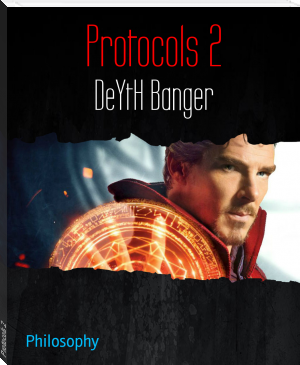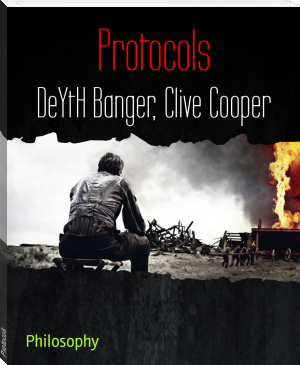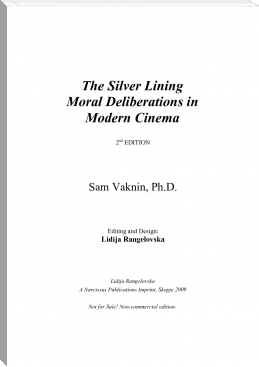Protocols 2 - DeYtH Banger (popular books of all time TXT) 📗

- Author: DeYtH Banger
Book online «Protocols 2 - DeYtH Banger (popular books of all time TXT) 📗». Author DeYtH Banger
by Philip Levine
Look, the eucalyptus, the Atlas pine,
the yellowing ash, all the trees
are gone, and I was older than
all of them. I am older than the moon,
than the stars that fill my plate,
than the unseen planets that huddle
together here at the end of a year
no one wanted. A year more than a year,
in which the sparrows learned
to fly backwards into eternity.
Their brothers and sisters saw this
and refuse to build nests. Before
the week is over they will all
have gone, and the chorus of love
that filled my yard and spilled
into my kitchen each evening
will be gone. I will have to learn
to sing in the voices of pure joy
and pure pain. I will have to forget
my name, my childhood, the years
under the cold dominion of the clock
so that this voice, torn and cracked,
can reach the low hills that shielded
the orange trees once. I will stand
on the back porch as the cold
drifts in, and sing, not for joy,
not for love, not even to be heard.
I will sing so that the darkness
can take hold and whatever
is left, the fallen fruit, the last
leaf, the puzzled squirrel, the child
far from home, lost, will believe
this could be any night. That boy,
walking alone, thinking of nothing
or reciting his favorite names
to the moon and stars, let him
find the home he left this morning,
let him hear a prayer out
of the raging mouth of the wind.
Let him repeat that prayer,
the prayer that night follows day,
that life follows death, that in time
we find our lives. Don't let him see
all that has gone. Let him love
the darkness. Look, he's running
and singing too. He could be happy.
Poem #33 - At Bessemer
by Philip Levine
19 years old and going nowhere,
I got a ride to Bessemer and walked
the night road toward Birmingham
passing dark groups of men cursing
the end of a week like every week.
Out of town I found a small grove
of trees, high narrow pines, and I
sat back against the trunk of one
as the first rains began slowly.
South, the lights of Bessemer glowed
as though a new sun rose there,
but it was midnight and another shift
tooled the rolling mills. I must
have slept awhile, for someone
else was there beside me. I could
see a cigarette's soft light,
and once a hand grazed mine, man
or woman's I never knew. Slowly
I could feel the darkness fill
my eyes and the dream that came was
of a bright world where sunlight
fell on the long even rows of houses
and I looked down from great height
at a burned world I believed
I never had to enter. When
the true sun rose I was stiff
and wet, and there beside me was
the small white proof that someone
rolled and smoked and left me there
unharmed, truly untouched.
A hundred yards off I could hear
cars on the highway. A life
was calling to be lived, but how
and why I had still to learn.
by Michael Schmidt
Out loud they cry, when they come back above ground,
A cheerful judder, then the chattering jaws -
Chorus of teacups clattering on a tray -
Barefoot, with the worms and roots still on them,
The puddles cool between their metatarsals.
Sunrise and shadow light sweep through their ribbing.
Seeing how they can be, again articulated,
Human as bones are when vertical and jaunty,
His heart is moved: how beautiful, he says,
And grasps then what it must mean to be human
Returning rested from the afterlife
Into the lovely dew of resurrection.
The skulls howl out their joy, and all are grinning,
Popping their knuckles, counting their vertebrae,
And now they dance alone and now join hands,
And as they dance there, in their ribs and rigging
In each grey skeleton a robin perches
Plumping its feathers, pulsing out its song
Red, and their twittering is blood and music.
- Never has he witnessed a scene so vital,
The dance of life the scripture guaranteed.
Faster as shadows shorten and noon rises
The skeletons spin and conga into the air
Making a cloud, a halo on the sun.
He takes his spade and sets it on his shoulder.
He's old. Until now he has known regret.
He's buried his grandparents and his parents,
His kings and queens, his brothers and his friends,
His lovers, all of them, the flesh turned food
And nothing, the bone bearing
In its chalk wholeness so much love and light.
From his own graveyard, with the dead departed,
One unfamiliar skeleton stands up
Tall, gracious, folding his fingers over
Two holes, and where his hurt feet strike on stone
Sparks from the rusty nails, and in his side
A spear, perch for a phoenix. Jesus Christ
Risen in this garden, and the wounds,
Or the bones that keep the marks of wounds are singing.
It's noon, there are no shadows. This is true.
He raised them and himself is rising up.
The place is empty now, the judgement over.
Later in the day the Prince arrives,
Stepping from his book as from a carriage
Drawn up among the holes in which the dead
Waited, and from which they are all flown.
Anxious, a bit deranged, he finds occasion
To hold a conversation with a skull.
Is it a skull or a stone that looks like a skull?
The heads are all gone to heaven, Jesus too,
Even the sexton put off his flesh and followed,
Ophelia was already on her star.
Poor prince, alone with just a book of ballads,
With just his plot nothing can save him from.
by Dorothy Wordsworth
HAT way does the wind come? What way does he go?
He rides over the water, and over the snow,
Through wood, and through vale; and o'er rocky height,
Which the goat cannot climb, takes his sounding flight;
He tosses about in every bare tree,
As if you look up, you plainly may see;
But how he will come, and whither he goes,
There never a scholar in England knows.
He will suddenly stop in a cunning nook,
And ring a sharp 'larum; but, if you should look,
There's nothing to see but a cushion of snow,
Round as a pillow, and whiter than milk
And softer than if it were covered with silk.
Sometimes he'll hide in the cave of a rock,
Then whistle as shrill as the buzzard cock;
- Yet seek him, and what shall you find in that place?
Nothing but silence and empty space;
Save, in a corner, a heap of dry leaves,
That's he's left, for a bed, to beggars or thieves!
As soon as 'tis daylight tomorrow, with me
You shall go to the orchard, and then you will see
That he has been there, and made a great rout,
And cracked the branches, and strewn them about;
Heaven grant that he spare but that one upright twig
That looked up at the sky so proud and big
All last summer, as well you know,
Studded with apples, a beautiful show!
Hark! over the roof he makes a pause,
And growls as if he would fix his claws
Right in the slates, and with a huge rattle
Drive them down, like men in a battle:
- But let him range round; he does us no harm,
We build up the fire, we're snug and warm;
Untouched by his breath see the candle shines bright,
And burns with a clear and steady light.
Books have we to read, but that half-stifled knell,
Alas! 'tis the sound of the eight o'clock bell.
- Come, now we'll to bed! and when we are there
He may work his own will, and what shall be care?
He may knock at the door - we'll not let him in;
May drive at the windows - we'll laugh at his din;
Let him seek his own home wherever it be;
Here's a cozie warm house for Edward and me.
by Dorothy Wordsworth
Peaceful our valley, fair and green,
And beautiful her cottages,
Each in its nook, its sheltered hold,
Or underneath its tuft of trees.
Many and beautiful they are;
But there is one that I love best,
A lowly shed, in truth, it is,
A brother of the rest.
Yet when I sit on rock or hill,
Down looking on the valley fair,
That Cottage with its clustering trees
Summons my heart; it settles there.
Others there are whose small domain
Of fertile fields and hedgerows green
Might more seduce a wanderer's mind
To wish that there his home had been.
Such wish be his! I blame him not,
My fancies they perchance are wild
--I love that house because it is
The very Mountains' child.
Fields hath it of its own, green fields,
But they are rocky steep and bare;
Their fence is of the mountain stone,
And moss and lichen flourish there.
And when the storm comes from the North
It lingers near that pastoral spot,
And, piping through the mossy walls,
It seems delighted with its lot.
And let it take its own delight;
And let it range the pastures bare;
Until it reach that group of





Comments (0)